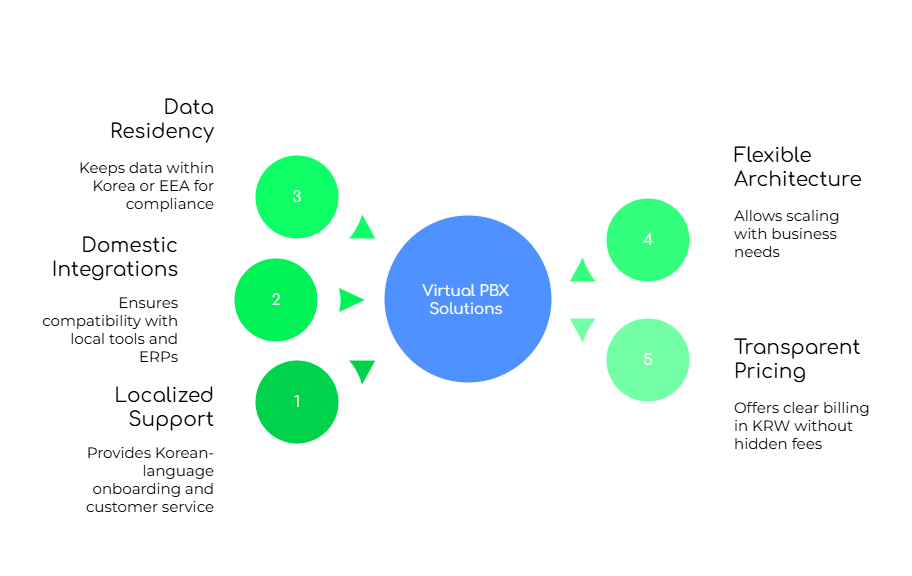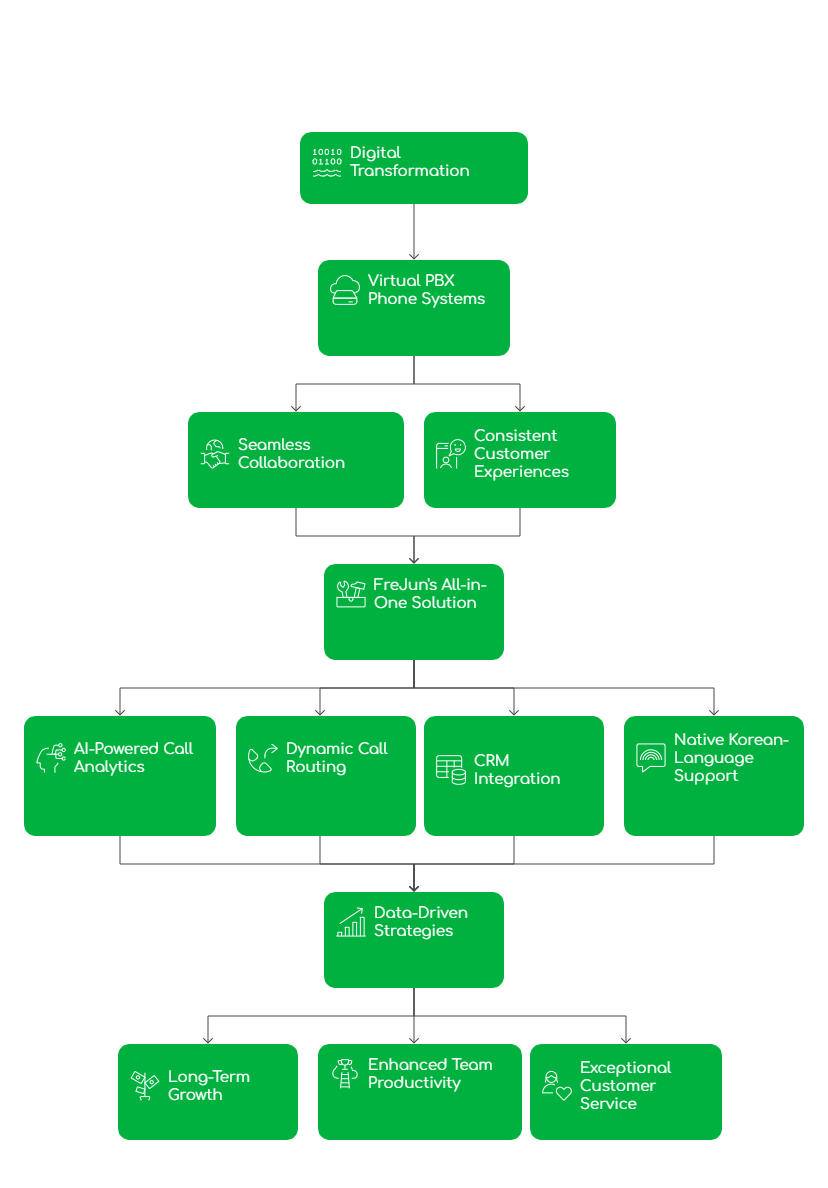Are traditional communication systems still meeting the demands of South Korea’s rapidly evolving business environment? As organisations adapt to remote work, digital transformation, and global customer bases, the need for agile, cloud-based phone systems is becoming more urgent than ever. Traditional PBX setups, tied to physical infrastructure, no longer offer the flexibility or efficiency needed to support modern workforces.
Virtual PBX Phone Systems Solutions are emerging as a vital tool for professional growth across South Korean industries. Whether it’s a tech startup in Busan or a multinational firm in Seoul, businesses are turning to cloud-powered platforms that deliver advanced call routing, seamless mobility, and cost-effective scalability. These systems not only enhance internal collaboration but also ensure every customer interaction is clear, efficient, and professional, driving growth in an increasingly competitive market.
Table of contents
- Why Are South Korean Companies Embracing Virtual PBX Phone System Solutions?
- Virtual PBX Phone Systems Solutions for South Korean Businesses
- Core Features That Drive Professional Growth
- Step-by-Step Setup Framework for Korean Enterprises
- Choosing the Right Virtual PBX Phone Systems Solutions Provider in South Korea
- Key Takeaways
- Final Thoughts
- FAQs
Why Are South Korean Companies Embracing Virtual PBX Phone System Solutions?
South Korea boasts one of the world’s fastest internet infrastructures and a workforce that quickly adapts to new technologies. As hybrid work environments become more permanent, organizations must provide reliable communication platforms that support mobility, continuity, and cost-effectiveness. Virtual PBX Phone Systems Solutions meet these demands head-on by offering device-agnostic access and browser-based control. Additionally, the rise in labor mobility and talent distribution means businesses need scalable systems that connect teams across regions.
A Virtual PBX Phone Systems Solutions platform enables flexible deployment without the delays or disruptions associated with traditional phone systems. With built-in disaster recovery, failover mechanisms, and real-time analytics, businesses are empowered to make decisions quickly, even in volatile markets. Government incentives and initiatives to digitize small and medium enterprises (SMEs) further fuel the transition. Companies are increasingly switching to Virtual PBX Phone Systems Solutions to manage their internal and external communications securely, efficiently, and professionally. It’s no longer a “nice to have,” it’s a strategic asset.

Virtual PBX Phone Systems Solutions for South Korean Businesses
A Virtual PBX (Private Branch Exchange) is a modern, cloud-hosted communication system that eliminates the need for expensive on-site PBX hardware. It lets businesses make, receive, and manage calls over the internet through a centralized platform. Virtual PBX Phone Systems Solutions handle call routing, voicemail, call recording, analytics, and integrations, all from a web dashboard or mobile app. For South Korean businesses, where connectivity and innovation are top priorities, Virtual PBX Phone Systems Solutions fit seamlessly into daily operations.

As South Korea becomes more digitally agile, Virtual PBX platforms act as a backbone for scalable communication. Furthermore, Virtual PBX Phone Systems Solutions allow companies to shift from hardware-heavy infrastructure to flexible, subscription-based systems. FreJun stands out by offering localized onboarding, native Korean-language support, and seamless integration with tools popular in the region like Kakao Biz and Naver Works. Its intuitive dashboard and AI-powered call analytics enable South Korean businesses to manage large-scale communication effortlessly, making FreJun a smart, future-ready choice.
Core Features That Drive Professional Growth
Modern Virtual PBX Phone Systems Solutions come with intelligent tools designed to scale business performance:

- Advanced Call Routing: Directs incoming calls to the right agent or department based on time of day, location, or customer input.
- Multi-Level IVR (Interactive Voice Response): Guides callers through voice prompts in Korean or English, improving first-contact resolution.
- Voicemail-to-Email: Sends missed messages as emails, helping teams respond faster and never miss important calls.
- CRM Integration: Syncs call records and insights with tools like Kakao Biz, Naver Works, Salesforce, and HubSpot.
- Call Analytics and Dashboards: Provides actionable insights into team productivity, customer trends, and call quality metrics.
- Call Recording and Archiving: Facilitates compliance, training, and quality assurance with searchable call logs and playback.
These features empower Korean businesses to offer consistent and professional customer experiences across all touchpoints.
Step-by-Step Setup Framework for Korean Enterprises
Setting up a Virtual PBX Phone Systems Solutions platform in South Korea can be straightforward when following a structured rollout strategy:

1. Define Communication Needs
Identify current bottlenecks in your call system. Are customers routed to the wrong department? Are calls missed during peak hours? Do sales reps need click-to-call tools? Define key objectives like improving call routing, reducing wait times, or integrating CRM data.
2. Assess Network Infrastructure
Ensure your internet connection supports high-quality VoIP calls. Providers typically recommend a stable bandwidth per concurrent HD call. Check home-office broadband conditions for remote workers, and consider upgrading routers with Quality of Service (QoS) settings to prioritize voice traffic.
3. Compare and Select a Provider
Compare and select a provider that offers native Korean support, clearly defined service-level agreements (SLAs), and local server hosting. Evaluate their features, onboarding process, customer support, and ability to scale with your business. FreJun, for example, provides reliable uptime, dedicated Asia-Pacific infrastructure, and transparent pricing in Korean won.
4. Configure System and Test
Set up extensions, business hours, greetings, IVR menus, and failover rules. Use FreJun’s drag-and-drop interface to map out call flows. Run a pilot phase with your customer-facing teams to test quality, performance, and usability.
5. Launch and Monitor Performance
Once validated, roll out the system across departments. Use analytics to track missed calls, average handling times, and agent activity. Tweak IVR flows, routing rules, or performance targets based on real-time feedback and data insights.
Choosing the Right Virtual PBX Phone Systems Solutions Provider in South Korea

A trusted provider must go beyond feature checklists. Choosing the right Virtual PBX Phone Systems Solutions means ensuring compatibility with regional tools, reliable support, and future-ready infrastructure.
- Localized Support: Korean-language onboarding, training materials, and customer service.
- Domestic Integrations: Compatibility with tools like Naver Cloud, Kakao Enterprise, and local ERPs.
- Data Residency: Data centers within Korea or the EEA for faster access and local compliance.
- Flexible Architecture: Ability to scale with seasonal surges, open new branches, or add remote agents.
- Transparent Pricing: Plans are billed in Korean won (KRW), with no hidden fees or vendor lock-in clauses.
FreJun meets all these criteria and is already trusted by a growing number of businesses across the Asia-Pacific region, including in manufacturing, fintech, education, and logistics.
Key Takeaways

Virtual PBX Phone Systems Solutions offer South Korean businesses a smarter, more flexible way to manage internal and external communication. With cloud-based infrastructure, centralised dashboards, and multi-device access, these solutions eliminate traditional PBX limitations such as static lines and hardware maintenance, while delivering better performance, mobility, and cost control. Businesses can quickly adapt to fluctuating workloads, scale communication effortlessly, and provide professional-grade support regardless of team size or location.
Whether you’re running a small startup or a nationwide enterprise, implementing Virtual PBX Phone Systems can boost productivity, reduce operational friction, and support digitally connected customer experiences. FreJun enhances this experience by offering local Korean-language support, native integrations, and enterprise-grade reliability aligned with South Korea’s push for ICT innovation. The platform is purpose-built for Korean businesses that demand both innovation and simplicity. With FreJun, companies gain not just a communication tool but a future-ready solution designed to scale with ambition and support long-term growth, reflecting national goals outlined by agencies like the Korea Communications Commission (KCC) and the Ministry of Science and ICT.
Final Thoughts

As businesses in South Korea continue their push toward digital maturity, Virtual PBX Phone Systems Solutions stand out as critical enablers of transformation. These cloud-powered systems replace outdated, hardware-dependent infrastructure with intelligent, scalable alternatives that support the demands of a modern, agile workforce. From enabling seamless collaboration across teams to delivering consistent customer experiences, Virtual PBX Phone Systems Solutions are shaping how Korean enterprises communicate in a globalized market.
FreJun’s all-in-one solution is designed specifically for South Korean businesses aiming to lead in this digital era. With advanced features such as AI-powered call analytics, dynamic call routing, CRM integration, and native Korean-language support, FreJun transforms everyday conversations into data-driven strategies. You’re not just adopting a phone system, you’re embracing a future-ready communication platform that fuels long-term growth, enhances team productivity, and helps deliver exceptional service at every customer touchpoint.
Further Readings – Virtual Phone Solutions for Jamaica-US International Trade Communication
FAQs
FreJun empowers remote and field teams by offering mobile and browser-based calling tools, ensuring seamless communication regardless of location or device.
FreJun allows complete customization, from multilingual IVR menus and hold music to detailed routing flows, so every caller experiences a brand-consistent interaction.
FreJun ensures secure communication with end-to-end encryption, Korean-compliant data policies, and infrastructure designed to meet national and international privacy standards.
FreJun is built for international scalability, offering robust infrastructure across Asia-Pacific along with localised support to help businesses grow without limits.
FreJun provides a guided, no-code setup with pre-built templates, helping mid-sized organizations go live in just a few days with minimal technical dependency.
